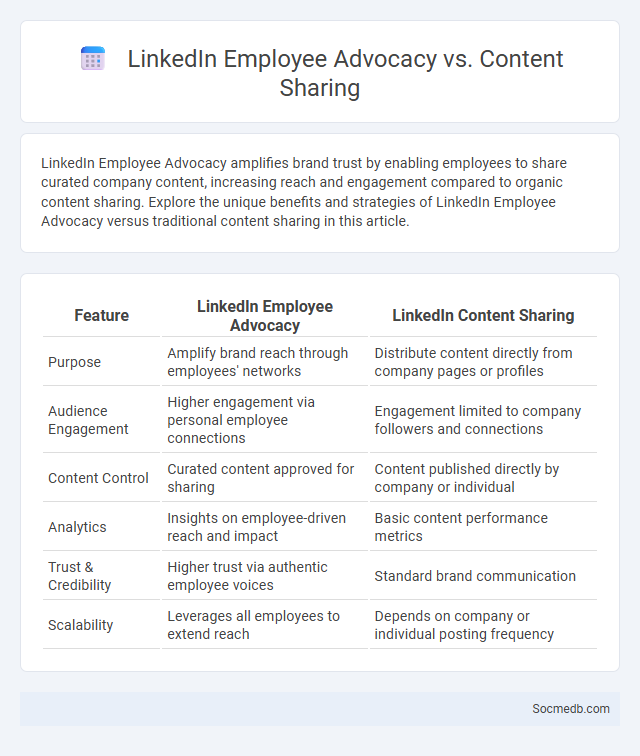
Photo illustration: LinkedIn Employee Advocacy vs Content Sharing
LinkedIn Employee Advocacy amplifies brand trust by enabling employees to share curated company content, increasing reach and engagement compared to organic content sharing. Explore the unique benefits and strategies of LinkedIn Employee Advocacy versus traditional content sharing in this article.
Table of Comparison
| Feature | LinkedIn Employee Advocacy | LinkedIn Content Sharing |
|---|---|---|
| Purpose | Amplify brand reach through employees' networks | Distribute content directly from company pages or profiles |
| Audience Engagement | Higher engagement via personal employee connections | Engagement limited to company followers and connections |
| Content Control | Curated content approved for sharing | Content published directly by company or individual |
| Analytics | Insights on employee-driven reach and impact | Basic content performance metrics |
| Trust & Credibility | Higher trust via authentic employee voices | Standard brand communication |
| Scalability | Leverages all employees to extend reach | Depends on company or individual posting frequency |
Understanding LinkedIn Employee Advocacy
Employee advocacy on LinkedIn leverages employees' personal networks to amplify company content, boosting brand visibility and credibility. Research shows that posts shared by employees generate 8 times more engagement than content shared directly from company pages. Implementing structured advocacy programs can increase reach by up to 561%, enhance lead generation, and strengthen employee trust and loyalty.
What Is Content Sharing on LinkedIn?
Content sharing on LinkedIn involves posting articles, updates, videos, and professional insights to engage your network and showcase expertise. You can amplify your professional presence by sharing relevant industry news, thought leadership, and original content that resonates with your connections. This strategic approach enhances visibility, fosters relationships, and drives meaningful professional opportunities on the platform.
Defining General Employee Advocacy
General employee advocacy involves empowering your workforce to share positive content about the company on social media platforms, amplifying brand visibility and credibility. This strategy leverages authentic employee voices to enhance trust and engagement among potential customers and stakeholders. Encouraging employees to participate in advocacy programs can significantly boost social media reach and influence.
Key Differences: Employee Advocacy vs Content Sharing
Employee advocacy involves employees actively promoting and endorsing a company's brand, products, or services through their personal social media profiles, leveraging their authentic voice and networks to build trust and extend reach. Content sharing refers to the act of distributing pre-approved or generic company content without personalized endorsement, often resulting in limited engagement and lower credibility. The key difference lies in employee advocacy's focus on personal storytelling and influence, whereas content sharing emphasizes broad dissemination of standardized messages.
Unique Benefits of LinkedIn Employee Advocacy
LinkedIn Employee Advocacy leverages your workforce to amplify brand messaging, resulting in increased trust and broader reach. Your employees' authentic networks generate higher engagement rates, driving quality leads and boosting employer branding. This targeted approach enhances visibility within professional circles, creating unique opportunities for business growth and talent acquisition.
Comparing Engagement Metrics
Comparing engagement metrics across social media platforms reveals how Your content resonates differently with diverse audiences. Metrics such as likes, shares, comments, and click-through rates provide insights into user interaction and content effectiveness. Analyzing these data points helps optimize strategies for higher engagement and better audience targeting.
Impact on Employer Branding
Social media significantly shapes employer branding by influencing how your company is perceived by current and potential employees. Positive online interactions and authentic content showcase your organizational culture, enhancing talent attraction and retention. Effective management of social media channels strengthens your reputation and sets your brand apart in competitive job markets.
Best Practices for Each Approach
Tailoring content for each social media platform is essential to maximize engagement, such as using high-quality visuals and concise captions on Instagram, while leveraging timely, news-driven posts on Twitter. Consistent posting schedules combined with audience interaction, like responding to comments and messages promptly, build trust and enhance community growth. Utilizing platform-specific features, such as Instagram Stories, Facebook Groups, and LinkedIn articles, optimizes reach and fosters deeper connections with target audiences.
Common Challenges and Solutions
Social media platforms often face challenges such as misinformation, privacy concerns, and user engagement decline. Implementing robust content moderation algorithms and transparent data policies can enhance user trust and safety. Encouraging authentic interactions through community guidelines and interactive features helps maintain vibrant, engaged online communities.
Choosing the Right Employee Advocacy Strategy
Choosing the right employee advocacy strategy involves aligning social media goals with your company's culture and values to maximize authentic engagement. Focus on empowering your employees with clear guidelines, training, and content that resonates with their networks, boosting both brand credibility and reach. Your strategy should leverage analytics to measure impact, refine approaches, and ensure sustained participation from your workforce.
 socmedb.com
socmedb.com